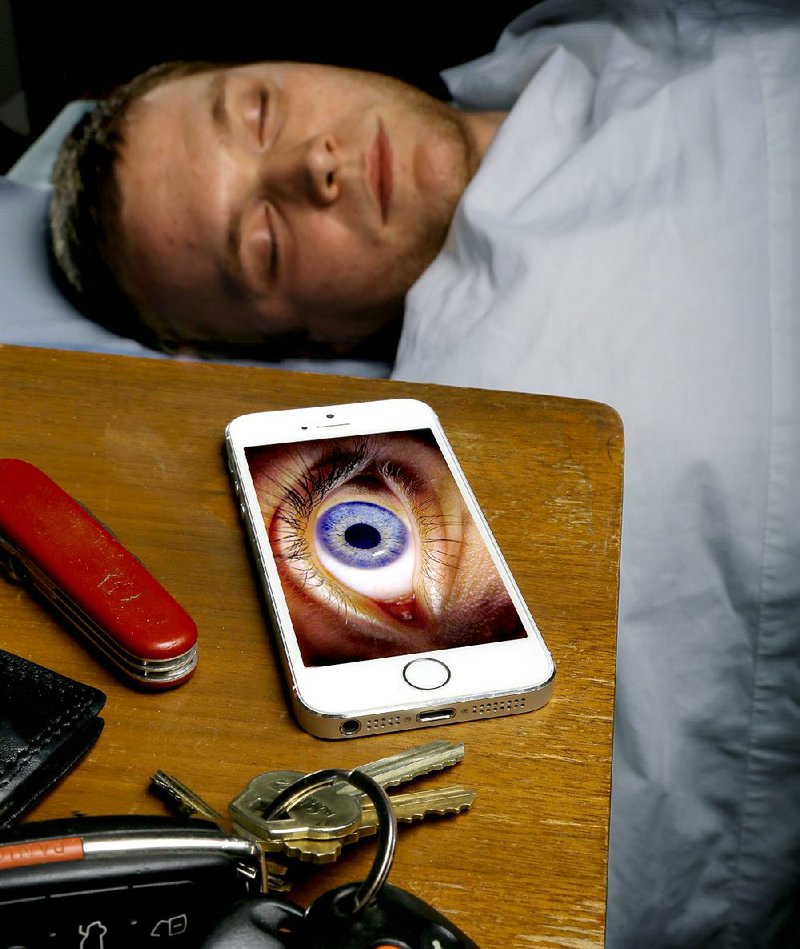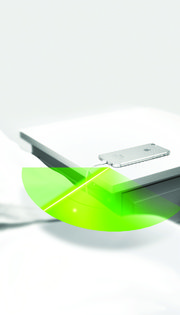"Young Paul [Bunyan] grew so big that his parents did not know what to do with him. Once, Paul rolled over so much in his sleep that he caused an earthquake. This angered people in the town where his parents lived. So the government told his mother and father they would have to move."
-- American Stories segment aired on Voice of America
Picture Paul Bunyan, swaddled in several mainsails that together make a giant's bedroll, getting his 40 winks 40 miles from the logging camp because (shivering timbers!) his snoring rocks oaks.
Picture Paul Bunyan today, college-educated, an associate in the risk-assessment department for Big Timber Inc. Still snubbed by the Sandman. A buzz saw by night, bleary-eyed by day. His hyperplasia is to blame for flabby airways and, thus, disrupted sleep. It's a big issue for Big Paul.
The ever-young Bunyan is contemplating an overnight sleep analysis at the local hospital. A polysomnograph, it's called. First he does what everyone does these days -- he Google searches "better sleep," and he discovers there are apps that "monitor" one's slumber.
He downloads Sleep Cycle, Sleep Better, SleepBot, Sleep Talk -- which is a sound-activated recorder that sits bedside and captures audio snippets of users' snoring or sleep talking (it does not monitor "sleep" per se) -- and Go! to Sleep from the Cleveland Clinic.
There are many, many others.
Most work by analyzing sounds picked up by the phone's microphone, which is on all night long. Some sounds, like thunder, get discounted, while others, like the rustling of a comforter, fit a sound pattern by which the app registers a particular stage of sleep. In the morning, most of these apps display a line graph with peaks for wakefulness and valleys for deep sleep. Some, like SleepBot, also offer several sound clips meant to sample snoring or gasping or sleep talking.
One, Go! to Sleep, is not an overnight "monitor" but a sleep log with tips. It is designed to change behavior, specifically, the behavior that encourages sleep avoidance and insomnia.
THAT'S GOOD (SLEEP) MEDICINE
When Bunyan informed his doctor he was handling his sleep disorder with a suite of smartphone apps, she frowned. Let's visit about this soon, she told the giant. (She used "visit" instead of "talk" because visit can be billed, thinks Bunyan.) The doctor reached out to a fellow Johns Hopkins alumnus at the American Academy of Sleep Medicine who sent along a couple of scholarly articles.
Last year, the Journal of Clinical Sleep Medicine published a study co-authored by a ruck of Seton Hall University physicians (bit.ly/1KqyIx0), and it's not good for smartphone apps.
The study enlisted 20 subjects, none of whom had any history of sleep disorders, to spend a night in the laboratory wired to the full manifest of electrodes attendant a modern polysomnograph. (See accompanying story.)
Before winking off to sleep, the experimenters activated the Sleep Time app (Azumio, $2).
The app proved fairly good at detecting when a person was asleep or awake, but poor at evaluating changes in sleep stages. It underestimated periods of light sleep and overestimated deep sleep to a statistically significant degree. Since the app graphs stages based only on restless movement and not cortical brain activity, eye movements and breathing, it misinterprets stillness as sleep.
"We recognize that this app was developed for entertainment and educational purposes," the researchers wrote, "and not as a substitute for a formal sleep medicine evaluation or standard sleep studies. We appreciate that the developers have been conscientious in cautioning users against treating the results of this app as diagnostic."
This is but one study of one app, and in the conclusion of the report, the doctors call for further study and, though they're too constrained to say it, further grant monies.
CREEPY FEATURE
The first night, Bunyan pauses as he sets his phone down on the dining table he uses for a nightstand. The phone will listen to him sleep? Listen? Maybe ... watch?
He shrugs. He doesn't do anything in his sleep more incriminating than what he does awake.
Malin Eriksson, a spokesman for Swedish Northcube, which developed Sleep Cycle, says users are asked permission for their sleep data seven days after the start of use. Only if the user agrees does the company collect data, for research and marketing, and then anonymously (just a sex, an age and a geographical location), and only sleep data (bedtime, wake time, etc.) not sound files or "raw data."
If you're not convinced, he says, put it in airplane mode. "The app will still work perfectly."
"None of these apps have demonstrated that they are very accurate in their measurements of sleep," says Chris Colwell, director of the University of California-Los Angeles Laboratory of Circadian and Sleep Medicine. But like smartphone pedometer apps, they can be still be helpful.
"I do not use an app myself to track sleep," says Dr. Caris Talburt Fitzgerald at the University of Arkansas for Medical Sciences Sleep Clinic, "but I do believe these apps may be beneficial to the general public for just the reason you expect -- mindfulness about the relationship between one's behavior and their sleep."
The sleep profiles Talburt Fitzgerald produces in her lab rely on several data sets gathered from contact points all over the body. A nightstand sound analysis is a poor stand-in. Still, she says that over the past year several new sleep-apnea patients made appointments after discovering their sleep was severely interrupted, according to their sleep-tracking apps.
If these apps, though, are leading others to apply the same sort of perfectionism driving them 16 hours a day to the remaining eight hours -- don't.
"Sleep is elusive," she says. "The more 'perfect sleep' is attempted, the higher your internal arousal is driven, thus leading to 'poorer sleep.' My advice is to consider your time in bed as a gift, a period given to you to free yourself from any negative thoughts."
FURTHERMORE
Later last year, the Sleep Medicine journal considered a spate of sleep-aid technologies in another article, this one titled "Consumer Sleep Technologies: A Review of the Landscape" (bit.ly/1Sghu8r). It considered wearable biometric trackers such as FitBit and Jawbone UP for sleep feedback as well as several apps including Sleep Cycle, SleepBot and Go! to Sleep.
The reviewers conclude there's very little medical support for the notion that these devices "track" sleep. Furthermore, "users may find it inherently disturbing to have a device actively recording or monitoring their sleep. Some apps collect information from individual users and make pooled data, both regionally and globally, available for public consumption, research or marketing purposes, without the user's enduring consent or knowledge."
It did, however, cite a report from 2014 in the same journal that found good agreement between a smartphone snore recorder function rendered as a Respiratory Disturbance Index and a polysomnograph's Apnea-Hypopnea Index.
MORNIN', SUNSHINE
After about three weeks and a half-dozen apps, Bunyan wearies. Each morning he looks at a graph, its peaks and valleys, and wonders what's it all for. What's the actionable data here, the risk assessor in him wants to know.
Now, he likes the soft wake-up, the "smart alarm." On sleep trackers such as Sleep Cycle and SleepBot, the alarm is set, say, for 6:30 a.m. If the tracker senses the sleeper is sleeping lightly within a 30-minute window before that, it will begin the alarm.
So softly at first -- an escalating reveille that tiptoes into the consciousness like a lisp on a character actor.
Bunyan likes Sleep Cycle's wake-up best. It's New Age, and so natural to his sleep envelope that, once, he heard it while still visiting with his late grandmother, and he was able to say to her, "See you soon, OK? OK, see you soon."
ActiveStyle on 02/15/2016

